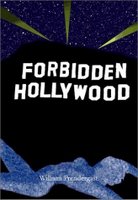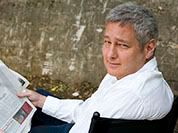Theater: World Premiere of the Sphincter
December 7th... A day that will live in infamy...
Yes, the first reading of my latest play, the Sphincter, will take an unprepared world by storm Wednesday, December 7th at 6:30pm at the Playwrights' Center. (Admission is free and you can get directions by clicking in the sidebar at right.)
I do not think I will sleep well tonight. I am already haunted by visions of the faces of the audience and the (unrehearsed) cast, contorted beyond recognition as they suddenly find themselves confronted with grotesqueries and obscenities that bespangle the narrative. This is not for the weak-hearted. Steel yourselves, audience, and screw your courage to the sticking place. Not only that, it's running about ten minutes too long. It's too bad I stopped drinking, that's all I can say.
Did get one major break today. The facilitator for the play reading (i.e. the sucker they drafted to supervise, read the stage directions, and lead the post-performance discussion) will be none other than Mary Jo Pehl, one of the brightest stars in the Minnesota stage, radio and television firmament. Ms. Pehl writes and performs audio pieces for National Public Radio and is probably best known to America as the maniacal "Dr. Pearl Forrester" on the legendary television comedy series "Mystery Science Theater 3000"
Ms. Pehl's presence will certainly lend a certain eclat to the proceedings, and we extend to her a warm welcome, which will be immediately withdrawn if she says she thinks the play stinks.



2 Comments:
christopher--thanks for coming.
triakel--don't worry about the spoilers thing, no one cares. here are answers to your "tongue in cheek" so-to-speak questions.
Out of sight of the audience and off stage, here is how the play ends: once the hero's anus returns to his body, the hero is doomed, because the anus is so important to the anus' partners in government that they would never hesitate to kill the hero in order to get it back where it belongs. That is, in fact, what happens to the hero--he simply disappears, and his wife and the other characters in the play are left to speculate on why the hero would suddenly disappear. (The hero's psychiatrist was "in on" the plot, in a peripheral way; he benefitted from spying on the Coburns for the sphincter administration.)
I didn't explicitly spell all this out in the script because I wanted an audience to figure it out for themselves--a rather dark ending for the comedy that they would have to put together. The "hero disappearance" angle was more explicit in the first draft of the play, but a friend pointed out that a funny play might not support such a dark and slightly depressing ending. So I went back to look at other famous "black comedies" (eg, Dr. Strangelove,
Terry Gilliam's "Brazil") to see how they solved the problem of appending a necessarily tragic ending to a funny story. I decided on the "character montage" thing because it allowed me to tell the sad end to the story while including more jokes (eg, dolphin assassins) to add laughs to the bitter ending. In the next draft, I will try to be clearer about "what happened to Bob", without losing the "funny tone".
Thanks for asking, it helps me to think about this and write out the proposed answers. I find that the best way to deal with the "sea raccoons" is to go home and dream about them yourself.
triakel--thanks for thinking about this so much.
I also like stories that don't tell you how to interpret the conclusion. But I hate stories that are unclear, which is why I think I have to make the hero's "disappearance at the hands of the government" fate clearer. How the audience interprets the story is their own business, but in terms of storytelling I was trying to give the audience a clear, unpleasant moment at the end of the play where they realize that the White House would indeed entirely eliminate a citizen like themselves (the play's hero) without so much as a second thought, in order to remain in power. As you pointed out, I was trying to set this conclusion up with the foreshadowing (the treacherous psychiatrist, etc.) But if I did my job as storyteller as well as I want to, there should be no question in the audience's mind that Bob disappeared at the hands of the government at the end of the story. I would prefer to have them "put this together themselves" (as you did) than to tell them outright, but the realization has to take place at a particular moment while the play is going on, not later, after the audience has left the theater. There are things I can do to make "the moment of realization about what has happened to Bob" stronger.
What does the asshole duality thing all about? I don't know, but if I had to write about it for a final exam I might argue something about how many Americans like Bob and Marchelle are so shallow and self-absorbed that they will allow an asshole to represent them and accept an asshole as their leader. We find out that once things are going well for Bob, he doesn't really care about anything else except how things are going for Bob--the war, the terrorism, the lying and the character issues, the fact that his country's leader is indubitably an out-and-out asshole--none of that matters to a person like Bob, so long as his life is going better than it was last year. So yeah, there is a sort of duality/reflection going on between him and his escaped, successful asshole--in their they both turn out to be nothing but shallow assholes. I just articulated all this for the first time right now, but I think some of the "duality" stuff you suggest is present in the short story I stole this idea from (Gogol's "The Nose") The hero's escaped nose turns out to be as big a snob as the hero was at the end of the story.
Why does the Sphincter return to Bob's body? I have no idea, and I have no idea why it left in the first place. It's just a miracle. There is a great paragraph at the very end of the original short story that sums that whole aspect up very nicely. You should find it and read it--it's a very funny paragraph and one of the best endings to a short story I've ever read.
Post a Comment
<< Home